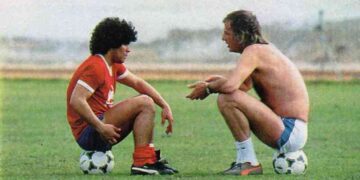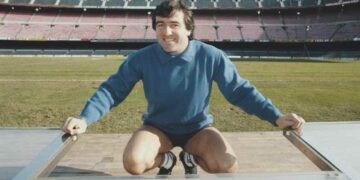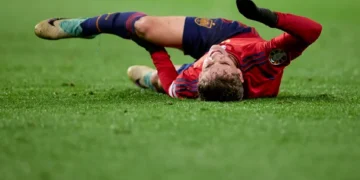Yesterday, Monday 25 April 2022 it has been 75 years ago that Hendrik Johannes Cruijff was born in Amsterdam. Unfortunately the football gods decided to take him away from us, more than 6 years ago already. But I honestly don’t know anyone in the world of sports and football in particular, who’s philosophy and ideas are still so much alive.
Johan Cruyff, he has an international family name where the Dutch ‘ij’ is replaced with the more common ‘y’, is still visible in the world of football today. Although the philosophy of ‘total football’ which he promoted and educated so well is almost 60 years old. His followers like Pep Guardiola, Erik ten Hag, Peter Bosz and Xavi Hernandez still keep on developing and improving his philosophy.
And you could say coaches like Jürgen Klopp, Hans-Dieter Flick, Louis van Gaal, Thomas Tüchel, Julian Nagelsmann, Alfred Schreuder and Marco Bielsa are heavily influenced by parts of his philosophy and use it on the pitch to create teams who play attacking football with high press.
To honor Cruyff’s legacy, I have written this article based on 14 important pieces of Johan’s football and life philosophy.
The result is not sacred, the way we play is
The decade of catenaccio, of winning in the most efficient way imaginable, came to an end when the world was introduced to a new phenomenon. Cruijff, Hendrikus Johannes, Phenomenon, as poet, football geek and Voetbal International (VI, the largest football magazine in the Netherlands) columnist Nico Scheepmaker praised him in book form in 1972. The James Dean of Football would Arsène Wenger later call him in VI. ‘Cruyff was a source of inspiration for my entire generation. Also because of its appearance. His whole behavior radiated freedom.’
This player was simply irresistible.
That spying gaze, the constant pointing, the constant talking. The sneaky locks that stuck to his face from sweat or danced behind him when he put it on a walk again. From zero to a hundred in a beat, because of that white shirt with red stripe a barely visible with the naked eye on the somewhat grubby, dark images of that time. Why with an inside foot when it is also possible with the outside, and the ball is even better able to find a never suspected way through a forest of legs? Even as he jumped high to avoid an incoming keeper, the football lover groaned with delight.
Understanding that football is an entertainment
Apart from his rebellious appearance, the gracefulness, the finesse, the class that dripped from his game, his approach to football was also extraordinary. And highly attractive. He not only played for his own pleasure, for his own honor and glory, but was also a servant of the people. The audience had to be entertained from minute one to minute ninety, that was his firm conviction. ‘If you’re 4-0 up and there are still ten minutes to go’, he once told Barend & Van Dorp, ‘it’s better to shoot two balls on the crossbar. So that people call uh and ah. Because if you make it 5-0, it’s only for the score.’
Especially abroad, such statements were scorned. A player who won the European Cup I (UCL nowadays) three times, the Dutch national title nine times and the Spanish one once, couldn’t mean that, could he? But Cruyff has always persisted that he really looked at his sport that way. “Of course I would have loved to win that final in Munich,” he sometimes said, for example, when people asked him about the lost World Cup final of 1974, “but the fact that people all over the world still talk about us as the team that played the most beautiful football is for me a bigger victory than that cup.”
Taking the next step
And after that wonderful player, who more than held his own in top football until he was 37, came the coach, or technical director. A role in which he no longer had to deal with people above him who had something to say about the way of playing. He didn’t take that anymore anyway. This allowed him to leave his mark even more on a team, on a club (including youth academy). Even more going his way with tactical finds, which, as you will read later in this special, are still used in football in 2022.
He was a football romantic, yes, but also because that’s how you have the best chance of success. “What I attached great importance to as a player and coach,” he once explained, “was not just winning, but also the way in which is important. So the fun. Actually, I find pleasure even more beautiful than the return, although of course you can not have fun if there is no return at all. But I never wanted to be with a team that wins everything, but whose football is not to be seen. In my opinion, everything you do based on an obligation never has a really high return.’
‘The value of beautiful football? It’s a pleasure you have in football year after year. Satisfaction. What good is it if I can hold a cup once and then nothing remains? I am sure: if you play really good football, you win an x-percentage of matches. Then it can depend on one or two matches whether you become champion or win that cup. But if you don’t play good football, you don’t have that in your own hands at all.’
Eternal influence
After he had already touched Ajax and Barcelona as helmsman within the four lines, he gave both clubs even more of themselves as a coach and later advisor. He gave them something of their own for eternity. Just as Cruyff was, Ajax and Barcelona are different from the rest in international football.
In the best sense of that word, according to Pep Guardiola. The man who owes his career as a player (Cruyff brought him out of seemingly nothing to the first team) and coach (after the departure of Frank Rijkaard Cruyff put him forward after one year of Barça B) to Number 14, does not let a moment pass by to explain his admiration for the Dutchman in detail.
When the current manager of Manchester City is once again complimented for the attacking and dominant play of his teams, he regularly gives Cruyff part of the credit. In the days of Messi, Xavi and Iniesta’s Barcelona, he spoke of a cathedral that his teacher had built in the heart of Catalonia. And that was only his and others’ job to maintain and renovate it. ‘No one in the world has given football as much as Johan Cruyff.’
Next chapter: 2. You learn to play football on the streets
Sources:
- Voetbal International (vi.nl)
- Johan Cruyff Institute (cruyffinstitute.nl)
- AFCAjax (www.ajax.nl)
- FCBarcelona (www.fcbarcelona.com)
Discover more from Barça Buzz
Subscribe to get the latest posts sent to your email.






















